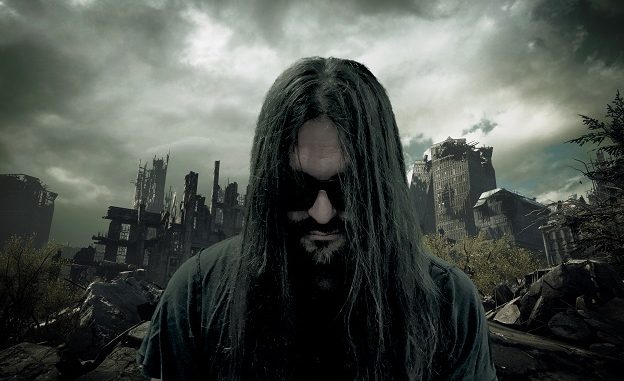
Derision Cult is a Chicago-based act that blends industrial with rock & metal. Their latest release, ‘Mercenary Notes Pt. 1’ features guests such as Justin Broadrick (Godflesh) and Reeves Gabrels (The Cure/David Bowie). We talked with Derision Cult leader, Dave McAnally about the new release and then some…
HI Dave. Thanks for talking with Brutal Planet today. Your music tends to lean about into the rock/metal arena and not simply industrial. So for some of the metal community who might enjoy your work, can you talk a little bit about the origins of Derision Cult?
I’m a a thrash metal guy at heart. Growing up on Metallica, Megadeth, and Anthrax, I found my way into the industrial scene in the 90s. Back then, I was in a band in Iowa and we were part of the same scene as Slipknot. The metal scene in Des Moines and Eastern Iowa was strong, but as Nu Metal took over and everyone had to have a rapper or turntablist, I decided to explore other sounds. I fell in love with the Wax Trax sound and the hypnotic atmosphere it created. David Bowie was also a huge influence, particularly his work with Reeves Gabrels and the wild sounds he created with guitar.
In 2014, I had a fire in me to start making music again, and with new technology and new ideas, I wanted to retain my metal roots while also incorporating the industrial sounds and beats that I love. My early demos were pretty thrashy, but over time, particularly on the album Mercenary Notes, I think we struck a nice balance between metal and industrial. That’s where I am now.
You’ve got a mixture of guests on the latest release, ‘Mercenary Notes’ Part 1. Talk about that and the genesis of how that happened.
Well, it all started with hooking up with Sean Payne. I knew that for this album, I wanted to work with a producer who could really bring that old school Chicago sound to the tracks. I’ve been a fan of Cyanotic and Glitch Mode for a long time, and Sean came from that Jamie Duffy/Acumen Nation school of thought. So, I sent him the demos and he was into it. That gave me the confidence to reach out to other musicians I really respected and see if they wanted to be a part of this project.
I have known Dan Milligan for a bit from The Joy Thieves, and he was kind enough to introduce me to Chris Connelly who played on the album. With Reeves Gabrels, it was just a matter of timing, I reached out to him and it worked out. The same goes for Justin Broadrick. I’ve known Jim Marcus from the Chicago scene and I thought his aesthetic would be perfect for this release. All in all, it was a pretty organic process.
On the ‘Mercenary Notes Pt. 1’ release, you tackle some pretty serious issues that perhaps the general public may not be aware that are going on. Talk about that briefly if you don’t mind.
As a recovering ad agency guy, I’ve always been drawn to the idea of overstimulation and using narratives to create groupthink. I spent a lot of my life helping brands shape perceptions and create vibes in the world, and while some of it can be inspiring and helpful, there’s a negative aspect to it too. I saw it get particularly ugly in the past several years and I wanted to shed light on it. Social activist groups and media thrive on people being angry and with social media and our short attention spans, it can get toxic.
That’s where Derision Cult comes in, we talk a lot about this. I like to compare it to revealing how a magician does his magic tricks, if you know how the trick is done, it won’t fool you. I don’t have any grandiose ideas about changing the world, but I’m doing my part in trying to bring the temperatures down a bit.
Do you think that since the last couple of years have been especially challenging with the Covid pandemic that perhaps people might have grown a little more vulnerable to advertising tactics being as many were stuck at home for extended periods of time?
Yeah, definitely. I’ve seen studies that show depression and anxiety have really spiked over the past few years, and when you’re in that state, you’re much more susceptible to irrational thoughts. It’s sad how polarizing everything has become politically, and it’s a bit scary. I’ve had to filter my own social media to block out the armchair political commentators, but it’s clear to see how toxic it’s gotten. These aren’t people who can actually do anything about the issues in Washington, they’re just fed a steady diet of Fox News or MSNBC and are livid about things they can’t control. Being quarantined and staring at screens, with a steady barrage of echo chambers about one complaint or another, it’s not good for human beings.
The actual title, ‘Mercenary Notes’ is both impactful but perhaps a bit curious. What, specifically art the “notes”? And what “notes” should consumers take away from your message?
Heh, one day Sean and I were just throwing around ideas. I liked the idea of the lyrics being like the notes of a former ad exec who pushed a lot of the narratives we talk about. The mercenary concept really just came out of how the ad industry felt to me by the time I left it. Especially on the creative side. You’re hired to create a certain vibe or perception in the world. We’re working on a second one now, hence the “Part 1” in the title!
How do you think your message would translate to a live audience since you haven’t played live with this project yet? Would you incorporate some kind of multimedia? And do you think you’d use the presentation to convey YOUR message or maybe take the perspective of an advertiser without the ulterior motive? What I mean is would your approach be blatant and in you face or more subtle?
That’s a good question! We’ve been talking about that a bit for the back half of the year. I don’t want to come off as preachy at a live show, so I’m more interested in making it a fun experience. I would definitely use video and be more subtle about it. We have a lot of fun making this music, so I’d want to inject some humor into that imagery. That’s a big part of the industrial scene that’s missing nowadays, I think. The humor and absurdity aspect. Those old Revolting Cocks or Thrill Kill Kult albums are full of those moments, and so were the shows.
You’ve had some remixes done for you but if you could remix anyone in the hard rock, metal industry, who would you remix? And what do you think as an artist makes for a successful remix?
We tried to get Devin Townsend, but it didn’t come together. I think of him as a metal guy, but Ken Marshall is killer. A Rob Zombie take on one of our tracks would be badass. I imagine hearing Joey Sturgis’ take on a song like “Year Hope Failed.” Remixes are more common in the electronic world, but there are some great remixers in the hard rock and metal world too. I’m working on a few remixes right now as a matter of fact so it’s kind of top of mind for me.
For me, a good remix is one where you can hear the artist’s spirit come through, where you can hear their thumbprint on the track. That’s what’s cool about remixes that Sean Payne does, you can hear the Cyanotic vibe. Justin Broadrick is the same way, he can put your track through the Godflesh filter. I also dig remixes that take the original track in a completely different direction. The Joy Thieves remix of “Deaf Blood” is like that, they turned it into this dark, brooding piece. Takes real work to pull that off. I did a mix for Bow Ever Down last fall of their cover of Madonna’s “Oh Father.” Their original version is more of a dance/EBM track. I did it as a big band track, with horns and everything, like it came out of the 1940s. It’s funny how it worked. There’s something about Madonna songs that make me think pre-rock I guess!
Since you talk about advertising in your lyrics, how do you feel the nature of advertising and promotion is changing in the music industry?
It’s a trip, man. I don’t really know! I was hanging out with some fellow musicians from the Chicago scene over the holidays, and we talked a lot about how a lot of, sort of traditional marketing techniques just don’t translate to music at all. There’s pros and cons to it, you know. On the plus side, it’s definitely easier to put out music now than it was back in the 90s. It’s all about how much content you’re willing to put out there, and how you can put it out there in a meaningful way. That part’s free! I keep a close eye on my Spotify stats now, which is something new for me.
One thing I’m seeing change is that gatekeepers aren’t as much of a barrier to entry as they used to be. With a little know-how, you can set up a Facebook or Instagram ad, target people who dig music like yours, direct them to their streaming service of choice, and build a following for pennies on the dollar compared to taking out ads in magazines and all that. You can build a fanbase on YouTube, Bandcamp and Facebook, and interact directly with those fans, make it all about you and them. Back in the day, that would’ve been a fan club with signups at gigs, postage and it’d be a lot more moving parts. As for the music itself, it seems like albums are a relic of a bygone era. I still like doing them for the art of it, but it’s definitely not necessary. Used to be 20% of your fans generated 80% of your income. Now, I think it’s more like 5% generating 95%. The cost of entry is cheaper, and getting to where that 5% can sustain your art is the goal. But I see bands doing it, though.
Thanks very much for your time. We’ll look forward to ‘Mercenary Notes’ Pt. II.
Definitely! We’re plugging away on it as we speak!
For more information:
https://www.facebook.com/300southdungeon
https://derisioncult.bandcamp.com/album/mercenary-notes-pt-1



